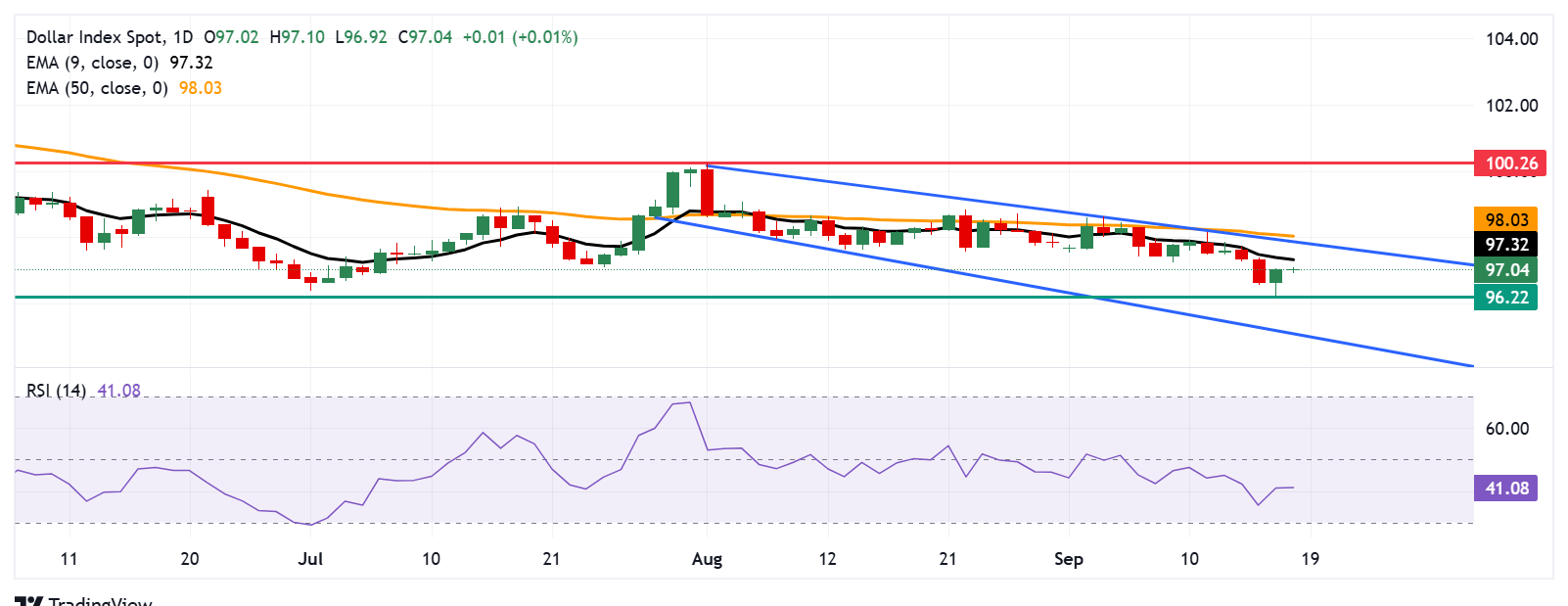US Dollar Index Price Forecast: Remains above 97.00, eyes nine-day EMA barrier
- The US Dollar Index may find immediate support at 97.00.
- Bearish bias prevails as the 14-day Relative Strength Index remains below the 50 level.
- The initial barrier lies at the nine-day EMA of 97.32.
The US Dollar Index (DXY), which measures the value of the US Dollar (USD) against six major currencies, is holding ground and trading around 97.00 during the Asian hours on Thursday. The technical analysis of the daily chart shows the dollar index remaining within the descending channel pattern, suggesting an ongoing bearish bias.
The 14-day Relative Strength Index (RSI) holds below the 50 level, strengthening the bearish bias. Additionally, the short-term price momentum is weaker as the DXY is positioned below the nine-day Exponential Moving Average (EMA).
On the downside, the US Dollar Index is testing its immediate support at the psychological level of 97.00, followed by 96.22, the lowest since February 2022, reached on September 17. Further declines would prompt the dollar index to test the lower boundary of the descending channel around 95.10.
The DXY may target its primary barrier at the nine-day EMA of 97.32. A break above this level would improve the short-term price momentum and support the dollar index to approach the descending channel’s upper boundary around the psychological level of 97.90, aligned with the 50-day EMA at 98.03.
US Dollar Index: Daily Chart

US Dollar Price Today
The table below shows the percentage change of US Dollar (USD) against listed major currencies today. US Dollar was the strongest against the New Zealand Dollar.
| USD | EUR | GBP | JPY | CAD | AUD | NZD | CHF | |
|---|---|---|---|---|---|---|---|---|
| USD | 0.03% | 0.18% | 0.06% | 0.05% | 0.19% | 0.62% | 0.10% | |
| EUR | -0.03% | 0.02% | 0.03% | 0.04% | 0.14% | 0.69% | 0.10% | |
| GBP | -0.18% | -0.02% | 0.02% | 0.02% | 0.11% | 0.59% | 0.08% | |
| JPY | -0.06% | -0.03% | -0.02% | -0.00% | 0.05% | 0.52% | 0.07% | |
| CAD | -0.05% | -0.04% | -0.02% | 0.00% | 0.12% | 0.72% | 0.06% | |
| AUD | -0.19% | -0.14% | -0.11% | -0.05% | -0.12% | 0.57% | -0.04% | |
| NZD | -0.62% | -0.69% | -0.59% | -0.52% | -0.72% | -0.57% | -0.49% | |
| CHF | -0.10% | -0.10% | -0.08% | -0.07% | -0.06% | 0.04% | 0.49% |
The heat map shows percentage changes of major currencies against each other. The base currency is picked from the left column, while the quote currency is picked from the top row. For example, if you pick the US Dollar from the left column and move along the horizontal line to the Japanese Yen, the percentage change displayed in the box will represent USD (base)/JPY (quote).

